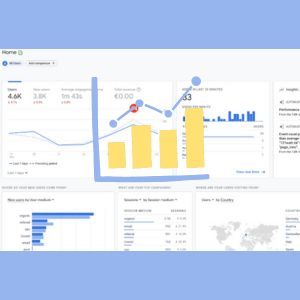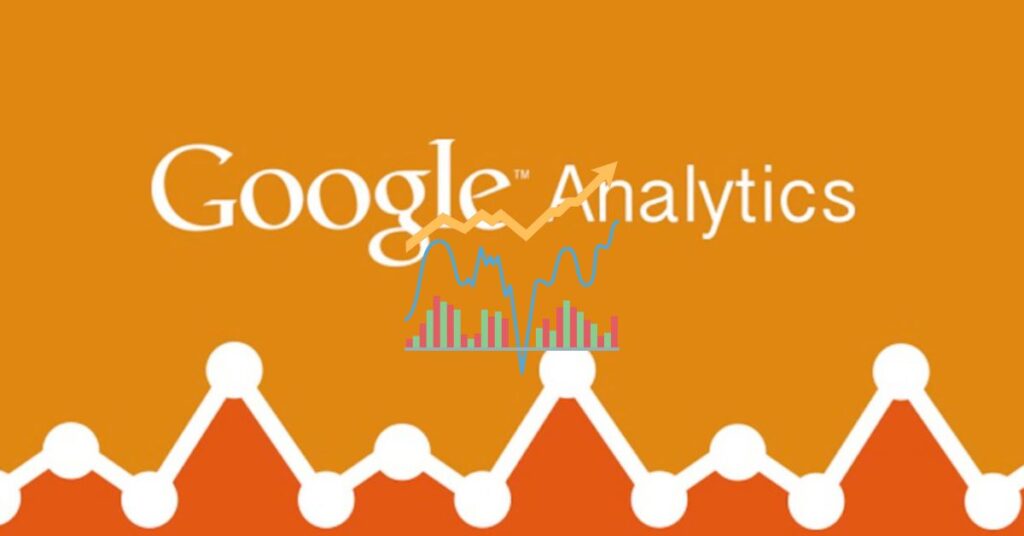Google Analytics, a capable digital analytics tool, provides enlightening data on how well websites and apps operate. In essence, it gives you the ability to keep an eye on contacts, activity, and user interaction on your digital platforms. Numerous data types are available through analytics.Whether you manage a personal blog or an online store, it enables you to make informed decisions and maximize your online presence.
Google Analytics and its Purpose
In the case of Google Analytics, Google is its owner. Customers can monitor website traffic and compile vital data for comprehending user engagement. Identifying user patterns, preferences, and actions .Because it is essential for developing digital strategies and optimizing websites.
Key Features of Google Analytics

A study of the sources of traffic
It offers details on the sources of traffic to your website. Referral links, sponsored content, paid search, and social media are a few examples.
Evaluation of the Content’s Performance
The technology provides statistics on user behavior so that material can more effectively tailored to the target audience. Such as including the websites that users visit, where they are from, and how long they stay there.
The tracking of conversions
Conversions include things like purchases and form fills. The amount of desired activities in businesses’ conversion funnels can be increased.
Consumer journey research and cart abandonment rates are useful in online stores. The result of product performance is tracking the improvement of the entire shopping experience.
Content Strategy Refinement
Content creators can improve their plans and output. So better to understand what their audience wants, they look at the content types that garner the most traffic and engagement.
User Experience Enhancement
Providing perceptions of user behavior, the technology helps organizations detect user problems and enhance website usability.
What is Google Analytics? Why is it Important?

A number of functional components can tracked and examine the website owners, marketers, and analysts. They can monitor how users interact with their websites using Google Analytics.Because It provides analytical information about user behavior on a website. What activities they take and how they interact with the page.
Important Google Analytics Features
Traffic analysis
Google Analytics maintains track of all the various traffic sources that reach your website. Such as Social networking, direct traffic, links from other websites, and organic search.
User Behavior
It keeps track of user behavior on your website, including bounce rates, the length of time users spend on particular pages, and the pages they visit. Because of its conversion rates, which display the percentage of visitors that successfully complete a given activity.
Audience details
It gives you demographic and geographic details on the people that visit your website. As a result, you might have a better comprehension of your target market.
Goal Observation
You may create customized objectives in Google Analytics for actions like making a purchase, submitting a contact form, or arriving on a certain page. This program kept track of the number of people who carried out these tasks and offered the data how successfully your website accomplished its objectives.
E-Commerce Surveillance
For online stores, it can gather and analyze e-commerce data on sales, revenue, and purchasing trends.
Real-time monitoring
It provides real-time statistics so you can constantly monitor the effectiveness of your website.
Conversion Attribution
You may identify the marketing efforts using Google Analytics’ conversion attribution tool. Such as advertisements, promotions, and social media updates and their main responsibility is conversions.
Particular Reports
Focus on the KPIs for your firm.Customized reports and dashboards can make based on your needs.
Analyzing mobile applications
Due to the fact that it was once use to gauge user interactions in mobile applications. In addition to monitoring online user behavior.
Site Speed Assessment
It is made public how quickly your website loads. Both the user experience and search engine rankings are dramatically impacted.
Applications of Google Analytics

The growth of online sales
Online retailers can utilize Google Analytics as a tool to improve the complete purchasing experience. To monitor user route statistics, basket abandonment rates, and product performance.
Make changes to your content strategy
In order to give more of what their audience wants, content creators can improve their workflow. Look into the most favored and well-liked content categories.
The achievement of marketing goals
Monitoring the volume of visitors and conversions each campaign produces.It can employed to assess the success of marketing campaigns.
Improving the user experience
The invention provides insights about consumer behavior that help firms identify customer problems and enhance website usability.
Setting Up Google Analytics
Making a User Account
as soon as your website is connected to a Google Analytics account that you have created. This initially updates the HTML of your website with a tracking code.
Creating Goals
Your website should have clear objectives, such as lead generation, sales, or content engagement.To keep track of these actions, create goals in Google Analytics.
Navigating the Google Analytics Dashboard

Overview of Dashboard Sections
With real-time data on visitors, sessions, bounce rates, and more, the dashboard provides you with a detailed snapshot of how your website is performing.
Creation of Custom Reports
Focus on the elements that are most crucial to your business. As a result, you can use Google Analytics to design reports that are personalized to your particular needs.
Privacy and Data SecurityProtection of User Data
Data privacy is highly valued by Google Analytics, which also offers users tools to help them comply with regulations like the GDPR.
Using unidentified IP addresses
The use of anonymous IP addresses substantially protects user privacy. Website owners have the option to make IP addresses anonymous.
How does Google Analytics determine the origin of visitors?
Uses a tracking system to determine the source of the traffic using cookies and URL parameters. very same There is a small amount of Google Analytics JavaScript code that is run. This code keeps track of user behavior while they browse a website in the background and collects information on how they use it. This is the procedure.
UTM Parameters
If a website linking to yours has specific UTM (Urchin Tracking Module) settings. These parameters will be obtained by Google Analytics from the URL. These guidelines are widely used in advertising campaigns and social media posts. URLs can be tagged with UTM parameters to provide information about the source, media, campaign, and other link-related components.
Google Analytics, for instance, can demonstrate that the traffic comes from a certain social media site and the campaign that is tied to it.If you use UTM parameters when sharing a link on social media.
Referral Information
When a user opens a link leading to your website from another website, the browser sends a “referrer” header with each request. So this data use for Google Analytics to identify the traffic’s origin. For instance, if a visitor follows a link in a blog post and is then forwarded to your website, you can identify the referring website as the source.
Direct Traffics
Every time a user accesses your website directly by entering the URL into their browser or using a bookmark, Google Analytics labels that traffic as “direct” traffic. This often means that the visitor knew the website’s address and arrived there without using any links from other websites.
Organic Search
When someone searches for your website and clicks on the search results, the search engine might be recognized as the source of the visitors. The search terms they entered are also kept as “keywords.”
Campaign Monitoring
The tool can associate visits with particular campaigns if you run marketing campaigns and have campaign monitoring enabled in Google Analytics. As a result, the campaign URLs constantly get updated with fresh tracking configurations.
Social Media
Google Analytics can identify the precise social media site where the traffic originated.It individuals share links to your content on social networking sites and other people click the links.
Summary
In conclusion, Google Analytics is an effective tool that gives website owners and marketers insightful data about their online presence. Businesses may make wise decisions to improve user experience. In order for marketing plans to succeed, they need to be optimized. that are knowledgeable about user behavior and performance data.
It’s a useful tool for determining how well online projects are working and for making adjustments for better outcomes. So togather information on how users find your website, Google Analytics employs a number of tracking tags. Cookies and URL parameters can be used to identify the origins of your website traffic.

